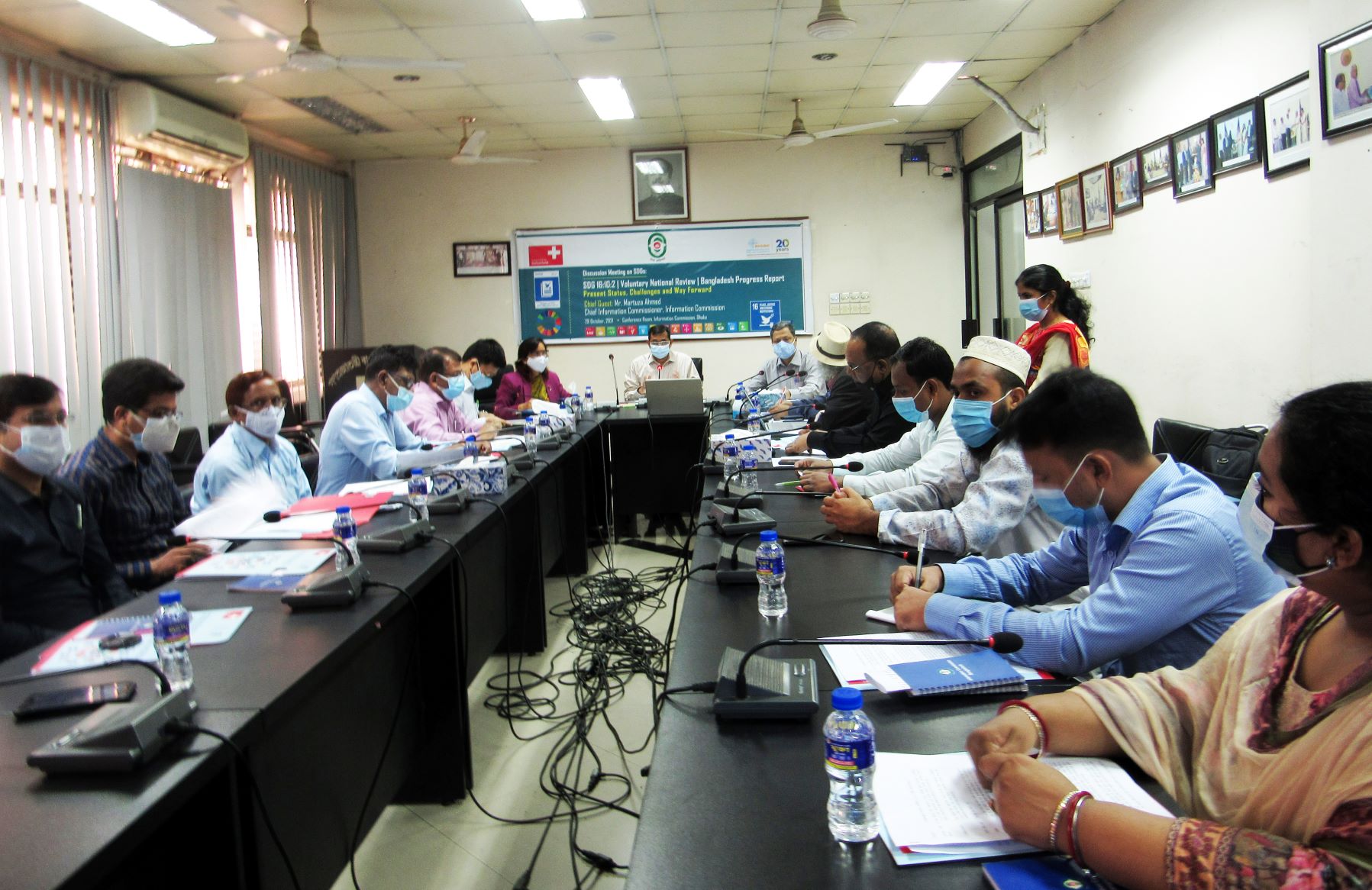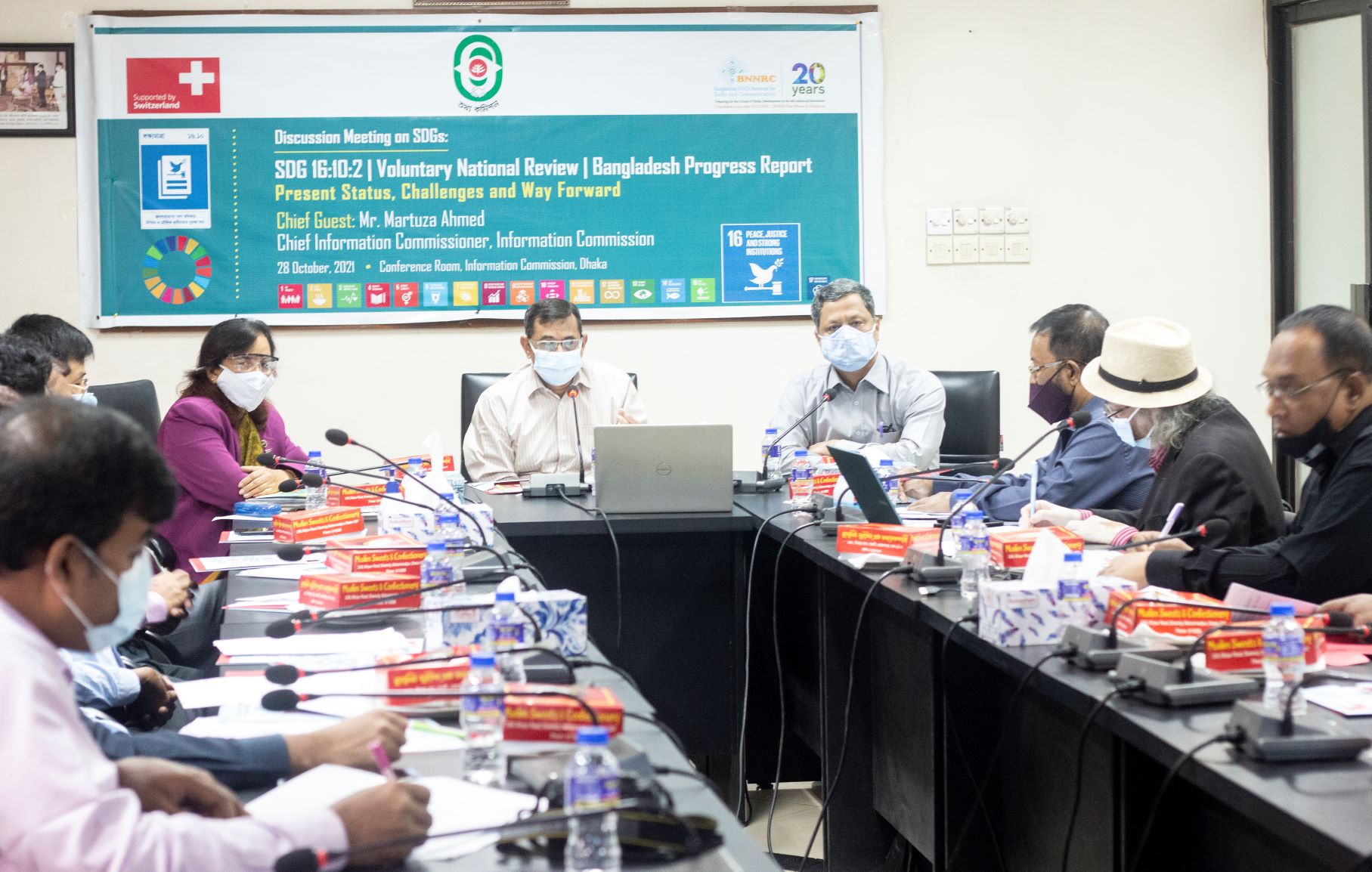Bangladesh NGOs for Network for Radio and Communication (BNNRC) organized a discussion meeting in collaboration with the Information Commission on 28 October 2021, Conference Room of Information Commission on SDG 16:10:2, Voluntary National Review, Bangladesh Progress Report, Present Status, Challenges, and Way Forward under Connecting and Empowering Voices for Just, Inclusive and Peaceful Society project supported by Switzerland Embassy in Bangladesh.
Bangladesh SDGs Progress Report 2020’ prepares the ground in the lead up to 2019, highlighting how much more effort will be needed to reach the SDGs and meet the commitment to leave no one behind. The year 2020 is a critical juncture to reflect on the first four years of the agenda 2030 implementation and to allow for adjustments to priorities and course corrections. For Bangladesh, it represents a key window of opportunity to inject urgency and catalyze updated or new commitments from all stakeholders–all of which will be necessary if leave no one behind goal and Agenda 2030 are to be achieved.
The goal of the program is to achieve the Sustainable Development Goals (SDGs) through the implementation of SDG 16.10.2 and making the role of the Information Commission more visible in the SDG Progress Report and Voluntary National Review (VNR).

Mr. Martuza Ahmed, Chief Information Commissioner, Information Commission as Chief Guest while Ms. Suraiya Begum ndc, and Dr. Abdul Malek, Information Commissioner present as Special Guests. A total of 21 participants from the Information Commission attended the discussion meeting.
Mr. Sudatta Chakma, Secretary, Information Commission welcomed the participants and highlighted that the Information Commission has been working for effective implementation of the Information Act 2009 and the community people are being aware of the issue and we have to work to ensure timely information and work on the challenges of implementation of RTI Act 2009.
Mr. A H M Bazlur Rahman, Chief Executive Officer of BNNRC and policy reserach fellow – shaping the future of media, information and entertainment in the era of the fourth industrial revolution has highlighted the SDG-16 with a special focus on SDG-16:10:2, SDG Progress Report, and Voluntary National Review (VNR). SDG 16.10.2.
He has proposed some intervention for the Information Commission like as Building Capacity for regularly monitoring and reporting on Indicator 16.10.2, Review of existing training materials on the monitoring and reporting on SDG 16.10.2, Planning of sensitization initiatives on the survey on SDG 16.10.2 for 2020, UN Plan of Action on the Safety of Journalists and start a campaign about Information Literacy in line with the Internet Governance Literacy program. This campaign will contribute to the e-Enabling in line with Supply-side and Demand Side e-Engaging and e-Empowering in line with the e-agriculture, e-business, e-commerce, e-employment, e-environment, e-government, and e-health.
He has informed to the commission that, since 2017, UNESCO designated as the custodian agency for indicator 16.10.2. UNESCO and its Institute for Statistics (UIS) have developed a methodology to help measure and report on this indicator. The survey was piloted in 2019, findings presented at a side-event during the UN’s High-Level Political Forum (HLPF) by UNESCO in line with the monitoring access to information, “adoption” & “implementation” with “National Questionnaire” and the “Institutional Questionnaire” and UNESCO has already developed the instruction manual: UNESCO Survey on Public Access to Information.
Mr. J. R. Shahriar Director (admin), Information Commission emphasized qualitative and quantitative data with a process. The Commission is responsible for undertaking five main types of functions, issuing directives and guidelines, conducting research and advising the government on improving the access to information regime and compliance with international instruments, building institutional capacity, conducting promotional activities, and resolving complaints.
Dr. Abdul Malek, Ph.D. Information Commissioner highlighted in his speech to work for the flow of a good data system. Our Prime Minister emphasized SDGs Localization and data is an important issue for the SDGs-related report. We have to work on good data collection and clean from any malpractice. We have provided services through an online platform during the COVID-19 pandemic.
Ms. Suraiya Begum, ndc, Infromation Commissioner said without peace, human rights, stability, and effective governance it is impossible to think about sustainable development. For sustainable development, the government looks to uphold the values of peace, justice, and strong institutions put forward by SDG-16. She said the Father of the Nation Bangabandhu inspired us on the issue leave no one behind after 50 years of independence we have reached the position. In the SDGs Progress Report, 6 goals were highlighted and in the progress report 2020, all 17 goals were highlighted.
Mr. Martuza Ahmed, Chief Information Commissioner, Information Commission mentioned as Chief Guest that Bangladesh enacted RTI Act 2009 and formed Information Commission but many countries don’t have any RTI Act and Commission. SDGs Progress Report 2020’ and Voluntary National Review prepared the ground in the lead up to 2019, highlighting how much more effort will be needed to reach the SDGs and meet the commitment to leave no one behind. For Bangladesh, it represents a key window of opportunity to inject urgency and catalyze updated or new commitments from all stakeholders – all of which will be necessary if leave no one behind goal and Agenda 2030 are to be achieved.
Information literacy is important to counter misinformation, mal-information, and disinformation. Internet governance literacy can play a vital role in this regard. Information Commission in collaboration with ICT Division of Ministry of Posts, Telecommunications and Information Technology and BNNRC can play a vital role in information literacy and internet governance literacy.
Dr. Md Abdul Hakim, Director (Research, Publication & Training), Information Commission moderated the session and stressed on Capacity Building is important for preparing the report of data visualization and data management.
We should prioritize on Localization of SDG-16:10:2, initiate a good data collection and preservation system, collect the most significant cases, study Voluntary National Review, SDGs Progress Report, and prepare a report about SDG 16.10.2 for the year 2022.
Switzerland Embassy’s representative Mr. Mohammad Nadim Rahman, National Program Officer, Migration and Local Governance virtually joined the session.
Bangladesh NGOs Network for Radio and Communication (BNNRC) is in Special Consultative Status with the Economic and Social Council (ECOSOC) accredited with World Summit on the Information Society (WSIS), SDGs Media Compact of the United Nations and UN WSIS prize winner 2016, Champion 2017, 2019 & 2020 for media development.
BNNRC’s approach to media development is both knowledge-driven and context-sensitive, and it takes into account the challenges and opportunities created by the rapidly changing media environment in Bangladesh including community radio development giving voices for the voiceless.
